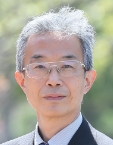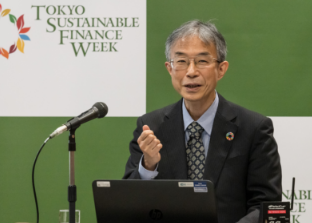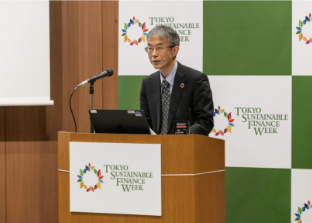This seminar was held in Japanese only.
Tokyo Metropolitan Government (TMG) has been proactively making efforts to promote sustainable finance through various actions in order to contribute to solving social issues through finance. As part of the effort, Tokyo Sustainable Finance Week was organized by the TMG from Feb 8th 2021.
During the Tokyo Sustainable Finance Week, we held “Financial Seminar for Citizens of Tokyo” - a seminar for citizens who are willing to learn basics of sustainable finance. At the seminar, experts lectured on the basics of finance and investment, the basics of sustainable finance, which is rapidly growing, as well as the practical methods.
The program was divided into two sessions. In the first half, basics of investment and sustainable finance was explained. In the latter half, practical method of investments was introduced by the experts.
| Time | Topic | Contents of the session | Lecturers |
|---|---|---|---|
| 13:00~13:05 (5 mins) |
Opening Remarks | Opening remarks by TMG |
Office for Strategic Policy and ICT Promotion, Tokyo Metropolitan Government |
| 13:05~13:50 (45 mins) |
Basics of Investment and Sustainable Finance | Basics of Sustainable Finance  |
Takeshi Mizuguchi Professor, Faculty of Economics, Takasaki City University of Economics |
| 13:50~14:45 (55 mins) |
Basics of Investment and Asset Formation | Minako Takekawa CEO, LIFE MAP LLC. Financial Journalist |
|
| 14:45~14:55 (10 mins) |
Q&A | ― | |
| 15:00~15:45 (45 mins) |
Practical method of Sustainable Finance | Types and characteristics of Sustainable Finance products
 |
Takeshi Mizuguchi Professor, Faculty of Economics, Takasaki City University of Economics |
| 15:45~16:30 (45 mins) |
Understanding Corporate Non-Financial Information Disclosure 
|
Kazuhiko Abe Executive Officer PricewaterhouseCoopers Sustainability LLC |
|
| 16:30~17:00 (30 mins) |
Q&A・Closing | ― |

Professor, Faculty of Economics, Takasaki City University of Economics
Takeshi Mizuguchi
Graduated from University of Tsukuba and received Ph.D. in business administration from Meiji University. After working for a trading company and an audit corporation, became a lecturer in 1997 and professor in 2008 at the Faculty of Economics, Takasaki City University of Economics. Specializes in responsible investment (ESG investment) and non-financial information disclosure. Served as chairman of the Positive Impact Finance Task Force of the Ministry of the Environment and chairman of the Impact Investment Study Group co-sponsored by the Financial Services Agency and the Global Steering Group for Impact Investment. Published "ESG Investment - A New Form of Capitalism" (Nikkei Business Publications) and "Responsible Investment - Changing the Future with the Flow of Funds" (Iwanami Shoten).

CEO, LIFE MAP LLC.
Financial Journalist
Minako Takekawa
After graduating from university, worked for a publishing company and a newspaper publisher before starting her own business. Obtained FP (Financial Planner) qualification in 2000. Conducting interviews, writings and also serving as a lecturer for investment trusts, iDeCo (individual-type Defined Contribution pension plan) and money plan seminars. Engaged in activities broadening the base of investment, such as serving as a selection committee member for the "Investment Trust Awards for 100 Million people" and as a secretary for "Evening networking for steady investors (in Tokyo)", a networking event for individual investors. Member of “Market Working Group, Financial Council of Financial Services Agency” since July 2016. Authored several books such as; "Revised Edition: The easiest and the most detailed explanation! Introduction of Investment Trusts" (DIAMOND INC.).

Executive Officer, PricewaterhouseCoopers Sustainability LLC
Kazuhiko Abe
Certified Public Accountant, Joined PricewaterhouseCoopers Sustainability LLC in 2008, and mainly focuses on providing support related to sustainable finance such as ESG investments for major financial institutions. For industrial companies, he provides support related to sustainability. Provided advisory and audit services for major financial institutions and big companies for more than 20 years in PwC. Member of screening committee for Ministry of the Environment “Environmental Communication Award”, Vice-chairman of The Japanese Association of Assurance Organizations for Sustainability Information, Auditor-secretary for Japan Sustainable Investment Forum. Co-author of “Introductory of Natural Capital"(Natural Capital Collegium).

Professor, Takasaki University of Economics Takeshi Mizuguchi
Professor Mizuguchi explained the definition of sustainable finance with familiar cases of everyday life and stated that “the impending limitations of a capitalist system” are the root cause of the requirement for sustainable finance. In addition, he introduced three reasons why investors implement sustainable finance: (1) ESG improves investment results (2) Universal ownership concept, (3)Sustainability preference of individual investors. Finally, he mentioned trends related to sustainable finance, such as the EU Taxonomy, which is being promoted globally, and Japan’s Green Growth Strategy Through Achieving Carbon Neutrality.

CEO, LIFE MAP LLC., Financial Journalist Minako Takekawa
From the perspective of a financial journalist, Ms. Takekawa introduced mainly how to manage personal assets and investment in sustainable financial products for individuals.
In terms of individual wealth-building, she provided a detailed explanation of iDeCo and Tsumitate NISA. She also introduced investment options and information useful for individuals investing in sustainable financial products.

Professor of Faculty of Economics, Takasaki City University of Economics Takeshi Mizuguchi
This lecture focuses on how to engage in sustainable finance from the perspectives of both financial institutions and individual investors. At a financial institution level, he explained the methods of ESG investment in each area of finance (stocks, bonds, loans, etc.). From the individual’s point of view, he explained practical methods such as how to identify financial institutions and asset management institutions that are good at ESG investment, basic knowledge of integrated reports and sustainability reports, and methods to strengthen ESG literacy.

Executive Officer, PricewaterhouseCoopers Sustainability LLC Kazuhiko Abe
This lecture covered topics related to disclosure of corporate non-financial information, such as standards of sustainability reporting and integrated reporting. Moreover, the characteristics of initiatives regarding environmental and social themes such as climate change and human rights were introduced. Furthermore, as an evaluation of companies’ sustainability initiatives, he explained the mechanism of sustainability ratings and the meaning of non-financial information disclosure, with specific examples.
Participants raised the following questions.
Q:The significance of ESG investment for return-oriented investors
A:There are two aspects, one is to improve the overall economy by reducing external diseconomies, the other is to consider ESG factors to ultimately improve investment performance, such as eliminating stranded assets.
Q:Information that can be used as a reference for individual asset formation
A:Introductory books, the “Shiruporuto" website of the Central Council for Financial Services Information, leaflets on investment trusts and tax systems issued by Investment Trusts Association and Japan Securities Dealers Association, etc.
Q:About information disclosure: current status and future direction of the unification of disclosure standards
A:Non-financial information disclosure is becoming mainstream, and there has been a trend toward the integration of various standards related to sustainability information disclosure.